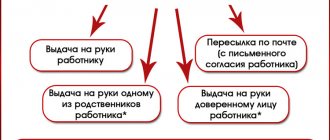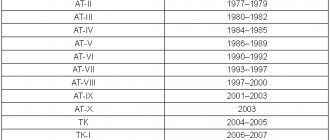Decor
A reprimand is usually formatted as follows:
- conduct an official investigation;
- they take an explanation from the guilty employee;
- issue an order indicating the type of disciplinary punishment.
In fact, these are the only official documents that reflect a reprimand against the employee.
The personnel officer can also make a corresponding note in the employee’s personal card form T-2 (there is no special column in the form). The fact that this or that disciplinary punishment was imposed on this employee.
As a rule, this is done because in some organizations the imposition of a reprimand/reprimand entails a consequence such as deprivation/cut of bonus. And since the effect of the reprimand lasts a whole year, so that when issuing an order for a bonus they do not forget to exclude this employee, they make such a note.
Also, information about the imposition of disciplinary punishment must be on hand if the employee commits a repeated offense within a year after the reprimand.
Types of Disciplinary Actions
Currently, legislation in the field of regulation of labor relations applies the following types of disciplinary sanctions:
- making a comment . This type of penalty is used in cases where we are talking about the commission of a disciplinary offense of minor gravity. Most often, this type of penalty is imposed in cases where the offense committed will not cause any damage to surrounding employees, but is expressed in a violation of the labor discipline established in the organization;
- announcement of reprimand . This type of penalty is more serious and may even entail termination of the employment contract if it becomes the second one in the last year (that is, less than 365 calendar days have passed from the moment the first penalty was issued to the second);
- dismissal . The use of this type of disciplinary sanction can be carried out if the employee has already had any violations of the established procedure for carrying out work activities or has other types of penalties. In this case, dismissal can be carried out both for a single gross violation of the labor discipline established in the organization, and for improper performance of one’s labor duties.
What information is included in the labor report?
A work book is one of the main documents of an employee. It reflects the following information:
- surname, name, patronymic of the employee;
- date of his birth;
- education;
- work experience, including information about all places of work, positions, transfers and dismissals.
This is indicated in the current rules for maintaining a work book. There is also a direct ban on entering other information into the work book.
When an employee is fired under an article, then in this case such disciplinary punishment can and should be entered into the work book.
Thus, the answer to the question - is a reprimand entered into the work book - is clearly negative.
Also see “Rules for filling out work books in 2020.”
The procedure for imposing penalties
The employer must exercise his right to impose penalties wisely.
When punishing an offending employee, you must adhere to the following rules:
- Act in accordance with accepted legislative standards and do not allow any personally invented penalties.
- Apply only one measure at a time. You cannot impose multiple punishments at once, such as reprimand and dismissal.
- Establish punitive measures based on the severity of violations. That is, one must correspond to the other.
To reprimand an employee, a special procedure must be followed. When a crime is discovered, the perpetrator is required to provide an explanatory note in which he is obliged to justify his action. The perpetrator has the right to refuse to write it. In this case, the commission appointed for this case draws up a report that sets out the circumstances of the case. The perpetrator must read the act and sign it. If he refuses to sign, then another document is drawn up, which indicates the fact of the culprit’s refusal to sign.
Where can you report information about disciplinary punishment?
When an employee is reprimanded, first of all, it is reflected in the order about it. Labor legislation does not regulate further dissemination of information about the reprimand. But the paperwork has developed in such a way that a reprimand may appear in the following documents:
| Document | Explanation |
| As was said - in a personal card in the T-2 form | There is no separate line here for information about disciplinary action, but you can add this in section 10 “Additional information” |
| You can attach a copy of the order to your personal file, which includes the T-2 card | Therefore, information about the reprimand is entered either on the card or in the personal file. |
| The reprimand can be reflected in the employee’s characteristics | For example, when an employee leaves the company and asks for a reference for another job. But in this case, you should remember: if a year has passed since the imposition of the reprimand. this reprimand should be considered invalid. |
| You can enter information about the reprimand in the order on the results of work for the year or quarter | This is done to resolve the issue of bonuses for this employee. |
Possible reasons
Before issuing a reprimand to an employee and recording it in the work book, it is necessary to inform him of the reason why the penalty is being applied, indicate the place where the offense was committed, indicating the time, as well as the date.
The reasons may be the following:
- absence of an employee from the workplace;
- absence from a safety exam;
- refusal of medical examination;
- any type of intoxication in the workplace.
But there are also reasons that can serve as a reason for a reprimand, but without being included in the labor record. These include:
- insult to an official;
- use of physical force against an official;
- other.
These offenses may result in fines, as well as criminal liability (in the case of physical abuse). Everything will depend on the severity of the committed act.
The main reasons why an employee can be punished with a reprimand or disciplinary action are:
- Absence from work without a valid reason. Moreover, if an employee is absent without warning for more than four hours, he may be fired for absenteeism;
- If an employee comes to work under the influence of alcohol or drugs;
- If an employee refuses to undergo a medical examination if intoxication is suspected;
- If an employee violates safety measures at an event.
Many employers do not know in what cases such a penalty can be issued. The most popular serious circumstances for issuing a reprimand include:
- being drunk at work;
- the employee’s refusal to undergo a medical sobriety examination;
- absence of an employee during a safety exam;
- absence of a person from his workplace.
There are also less serious circumstances for which a reprimand can also be given, but without entering it into the employee’s record book:
- insult or disrespect towards an official;
- use of force against officials;
- other less serious circumstances.
In addition to disciplinary liability, financial or civil liability may arise. Everything will depend directly on the offense committed and the severity of the consequences that occurred. You can learn more about this from the video presented.
If you include a reprimand in your work book
Sometimes the employer puts a reprimand in the work book on principle. As a rule, this is done in the section intended for information about incentives and awards.
In this case, the employee has the right to demand that this entry be removed. If the employer does not agree, you can contact the relevant authorities:
- to the labor inspectorate;
- prosecutor's office
The employer will be given an order to bring the work record book into proper form. Therefore, entering a reprimand in the work record book may have negative consequences for the company in the form of a fine and other sanctions.
Also see “Gratitude in the work book: sample and what it gives.”
Features of issuing a reprimand
When occupying an official position, each newly hired employee signs an employment contract, which must clearly outline the key rights and responsibilities of the parties. If, during the course of his work, an employee refuses to perform or poorly performs prescribed duties, then the employer has a legal basis to reprimand the subordinate.
When imposing such a punishment, the following facts must be taken into account:
- the severity of the offense;
- the circumstances of the incident;
- personal qualities of the employee;
- attitude towards discipline at the place of work;
- characteristics from previous places of work (if such paper is available).
A reprimand is rightfully considered one of the most severe forms of disciplinary action, which should have a sobering effect on the employee. If this does not happen, then the employer can dismiss the employee, citing failure to fulfill his professional duties. According to statistics, more than 70% of workers begin to take their work activities more seriously after receiving penalties, and a reprimand is perhaps the most effective measure in the fight against human irresponsibility.
This penalty is very serious because it is recorded in the book. Accordingly, all other employers will see this record, and it may interfere with the person’s future work career. Therefore, before issuing this punishment, the following aspects must be taken into account:
- the severity of the offense; not all disciplinary violations are so serious that they need to be recorded in a work record book;
- personal qualities of the employee, in some cases you can turn a blind eye to certain violations of a person, if at the same time he achieves his goals and fulfills his tasks;
- the circumstances of the incident, in some cases it happens that a person was forced to violate discipline, although he himself did not want to do it;
- disciplinary behavior, it is important to evaluate a person not only for one violation, but in general for all his behavior over a long period of time;
- personal characteristics from past jobs, it is likely that the employee had a good reputation, and spoiling it because of one offense is not always right.
Taking into account all these factors, the manager must make a well-informed and objective decision about the need to issue a reprimand. But if the need for it is great, it really needs to be done. Practice shows that in most cases a reprimand has a positive effect on the employee, and he stops violating discipline.
Rules for making comments to employees
A remark addressed to an employee is one of the alternatives to a reprimand.
To apply such a punishment, you need to perform several actions:
- Preparation of a memo describing the comment.
- Requirement for explanations from violators.
- Drawing up an order confirming the punishment.
- Presentation of the order to the employee against signature.
Compared to reprimands, remarks as a type of punishment are more loyal. The absence of repeated violations here also means automatic cancellation of old ones. Early removal of penalties at the initiative of one of the parties is permissible.
https://youtu.be/knR6-cUJ2lY
Removal
The total period of validity of a disciplinary sanction is no more than one year from the date of its issuance. The situation with this type of penalty such as dismissal is no exception - it is subject to general rules, as well as other types of penalties.
However, the employer can use this opportunity only in relation to the employee who continues to be on his staff and perform his duties in relation to such an employer. If the employee was dismissed, then the removal of the penalty against him becomes impossible, except after its expiration, that is, one year after the issuance.
In the event that we are talking about identifying an offense after a certain time has passed since the commission of such an offense, then it should be taken into account that a penalty can be imposed only until the expiration of a period of three months from the date of commission of such an offense . Otherwise, the penalty itself will be considered unlawful, and its removal will become a useless and meaningless action.
However, it should be taken into account that the employer who discovered the misconduct does not have the right to contact the new employer, since when changing places of work, the employer’s rights to impose a penalty on its resigned employee are completely lost. The only option for bringing to justice is to go to court on the basis of existing documents about misconduct.
https://youtu.be/tG6GrA8o2F8
Dear readers, each case is individual. If you want to find out how to solve your particular problem, call :
Or on the website. It's fast and free!












